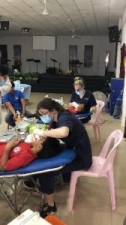Search

 Ashburton dental students Albertene Hefford, front, and Ruby Wills work on young patients in Cambodia. Photo supplied.Two young Ashburton women have been helping change lives and the dental hygiene habits of hundreds of poverty-stricken children in Cambodia.
Ashburton dental students Albertene Hefford, front, and Ruby Wills work on young patients in Cambodia. Photo supplied.Two young Ashburton women have been helping change lives and the dental hygiene habits of hundreds of poverty-stricken children in Cambodia.
Ruby Wills and Albertene Hefford, both 22, have just completed the fourth of five years training at Otago University to become dentists. They put their skills to work recently by volunteering to treat youngsters in Cambodia’s capital city, Phnom Penh, where dental care is not free for children.
The work was heartbreaking and took an emotional toll on the women, but they say that the volunteer dental programme is slowly changing the habits of young Cambodians.
Ruby, who is also president of the New Zealand Dental Students Association, said the mobile clinic was set up in a school hall and equipment was basic, with electric drills run from generators.
Around 200 children, mostly between the ages of six and 12, were treated in the week-long clinic.
She said many presented with serious decay and she was one of five volunteer dentists from Otago treating, filling or extracting teeth. Some children had teeth that had decayed down to the root stump, which would have been very painful.
Cambodian dental students assisted in the clinic, often interpreting for the Kiwis.
The volunteer work was organised by One2One, which offers health programmes in developing countries.
Ruby and Albertene, who both went to Ashburton College, saved at least $2000 each over the past two years so they could be part of the volunteer team.
In exchange, they had a life-changing experience, working seven hours a day, in 30 degree heat, wearing masks and gloves.
In Cambodia, a local dentist first screened the children who then proceeded down a treatment line with notes about recommended work, which ranged from fluoride treatments and sealant for permanent teeth to basic fillings and extractions.
Ruby said poor oral hygiene, a lot of sugary food and a lack of education resulted in some heart-breaking situations, but the children were brave.
All were sent away with a toothbrush, toothpaste and instructions on how to clean their teeth.
A positive was that some children who had been treated at an earlier clinic showed improved oral health, she said.
“You could see improvement and could tell some had avoided further issues due to the education and the work. The idea is that we are helping them for now and setting them up for the future.”
Ruby said the experience was also about helping the student dentists better understand patient behaviour; they hope to do more charitable work in New Zealand when they graduate.
“Confidence, smiling and eating … that is huge.”
In their final year in 2020, the two women will do 24 hours a week clinical work, a lot of it charitable, in Dunedin as well as a five-week placement.
Albertene is heading to Gisborne for her placement while Ruby is off to Tonga.
Ruby said it was important for graduating dentists to know as much about the cultural backgrounds of their patients and barriers for maintaining good oral health.
“We do a lot of dentistry and gain more knowledge about different cultures here in New Zealand so we can better treat people.”
By Linda Clark © The Ashburton Courier - 7 January 2020


